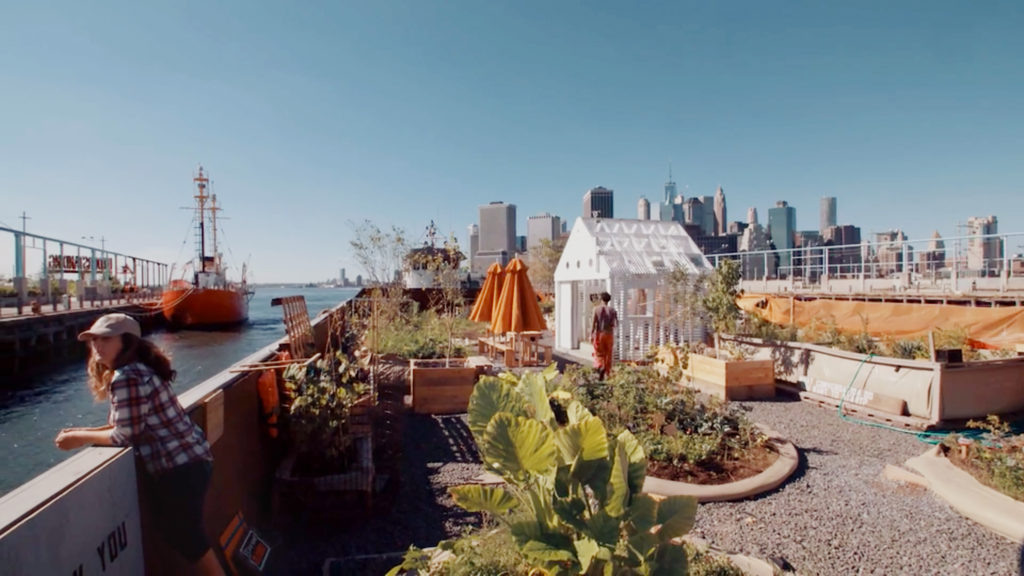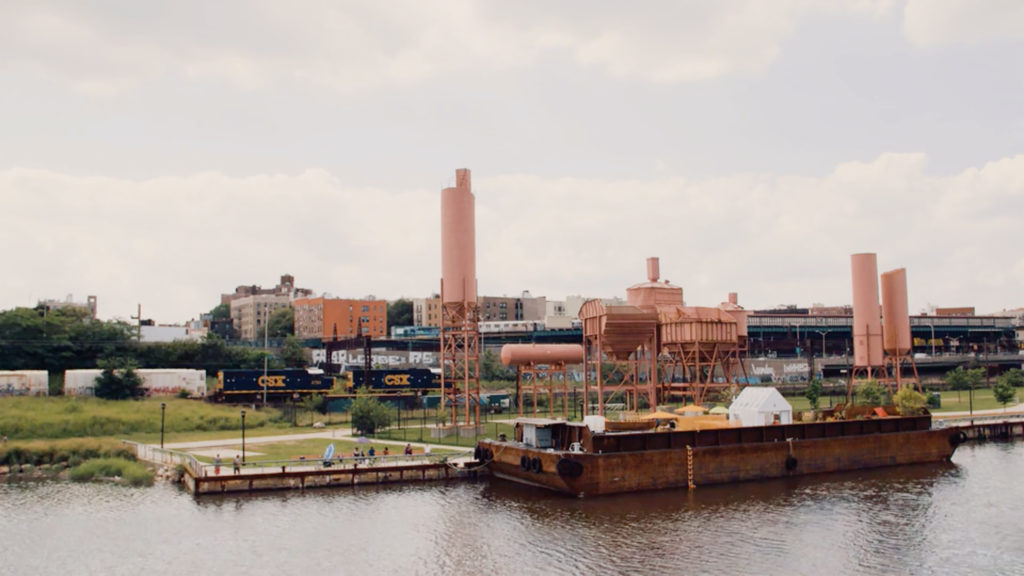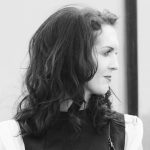
A Blade of Grass Fellow Mary Mattingly aboard her project Swale, a floating food forest welcoming visitors to harvest food for free, and offering educational programming throughout New York City’s harbor. Photo courtesy of RAVA Films.
Editor’s Note
__
New York-based artist Mary Mattingly challenges environmental and economic norms by enacting alternative systems. Whether she’s transforming a barge into a public food forest on the East River, or repurposing a military vehicle into an interactive performance stage, Mary’s work models creative approaches to enacting social change and sparks the imagination of those who experience it.
Dear Mary,
I can’t sleep at night! I want my project to be accessible and welcoming to a wide set of publics. With that in mind, I am happy to break free of avant gardist demands that the form of my work be disruptive and/or create estrangement. But how can I suggest transforming our society and lives if the form and aesthetics remain close to what is already accepted and known? Is there a happy medium? Can I have my cake and eat it too?
Signed,
Sleepless and wanting to eat cake in Brooklyn
Dear Sleepless,
Working together in public involves the art of compromise, or embracing the idea that learning is always alive. If we are given a space to begin a process of compromise, then that is where the public art begins. As artists, we can ask our community collaborators to keep visualizing past the realm of potential and into realms that can feel uncomfortably utopian, with us.
Here’s why: I believe that proclaiming our eco/social goals and values through our art and work allows us to imagine its effect, and makes space for others to do the same through co-creation of that artwork. Holding space for compromise (or entropy, depending on how we see it) is essential as an idea manifests in the world. I think you’re correct, and believe pushing boundaries further than may seem comfortable is important in incremental change. I want to encourage us to manifest our ideas one step further than even we can envision them—as ideals that we aren’t even sure whether we ourselves understand. We can do this assuming that when those who are uncomfortable with difference have taken their turns tearing us down, we
As artists, we can ask our community collaborators to keep visualizing past the realm of potential and into realms that can feel uncomfortably utopian, with us.
may still be ahead of where we began, and in this way we can help incrementally build change. I believe that when a certain type of change is our mission, we cannot be on the defense in our goals, we must be on the offense. Of course, building together is key: creativity alone asserts our collective and individual voices, but without a creative community, it is near impossible to exercise the power of multiplication. While it’s difficult to give concrete suggestions without knowing more about your project, what I can say is that while change is incremental on a societal scale, can’t radical thought on a personal scale be just as accessible and welcoming, and even desired? It is the vocation of the artist and thinker to keep imagination alive and to continue weaving stronger fabric, making and reframing the present and future of our shared society.
Mary

Swale docked at Concrete Plant Park in the Bronx, New York. Photo courtesy of RAVA Films.
Dear Mary,
For the past year and a half, as part of a group of artists and community members, I’ve been working on addressing cultural erasure and displacement in our city’s Chinatown. I also work a job that is arms-length to the City, which puts me in a space where I and my supervisor have to make clear my position as an employee when working in this community. Luckily my supervisor listens and is supportive.
Recently, I’ve come across a label that people have placed on me, which has negative connotations for them, so it becomes a barrier. Some have called me an activist: I’m not so sure I am and this label is neutral to me, however, I call myself an engaged citizen and an active, socially-aware, and conscious person and artist.
Have people ever placed a label on you that has negative connotations for them, so that it becomes a barrier for the work? Do you have to manage these labels? Where is the line between spinning the language so that it is more palatable versus being dishonest? For example, using the word “gentrification” vs. revitalization, cultural erasure, or displacement. Or using the word “intersectionality” rather than bell hooks’ “imperialist white-supremacist capitalist patriarchy.”
Thank you,
GLAW
Edmonton, Canada
Dear GLAW,
First, I’ll say that I think it’s necessary to formally share how you’d like to be perceived in your multiple roles. I think it’s fair to use labels for yourself as you see fit, especially as an “artist”—that’s the power we have as artists with multiple social roles in the different communities we are part of. We know that this creativity evokes contradiction, tension, and complexity, but also that it’s our job to hold our own inconsistencies in balance, or else they will leave us unable to thoughtfully act. As thoughtful actors, an ethics of shape shifting may also be in order, but at the end of the day, switching roles can help everyone break down silos and stereotypes.
That said, I also think that there are times when embracing how we’re labeled by others, even if we don’t understand or agree with that label, is fine. If we have shared our preferences and people choose to ignore them or call us by another name, it doesn’t take away who we are, or what else we have to offer. Labels are used as shorthand, as a way to categorize in a world that often feels out of control or too big to comprehend. We can choose to give people the benefit of the doubt, lest we waste our energy and time concerning ourselves with others’ perceptions of us, when it’s our work that really matters in this context. Operating with dignity in our multiple roles has such potential to break from the label-logic formed through generations of training, and to open up a more nuanced comprehension not based in a binary of honesty versus dishonesty, but that speaks to the fact that we all are more than the sum of our labels.
Mary
Mary Mattingly is an artist working in varied forms of sculpture and photography, focusing on environmental, economic, and political change. A participant of smARTpower, a program initiated by the Bronx Museum of the Arts with the US Department of State, she implemented collaborative sculpture as architecture with residents in the Philippines in 2012. As an A Blade of Grass Fellow in 2016, she launched Swale, a mobile floating food forest built atop a barge that travels New York City waterways to offer educational programming and free produce for the public to harvest. She has been awarded grants from the James L. Knight Foundation, Eyebeam Center for Art and Technology, the Harpo Foundation, NYFA, the Jerome Foundation, and Art Matters.



